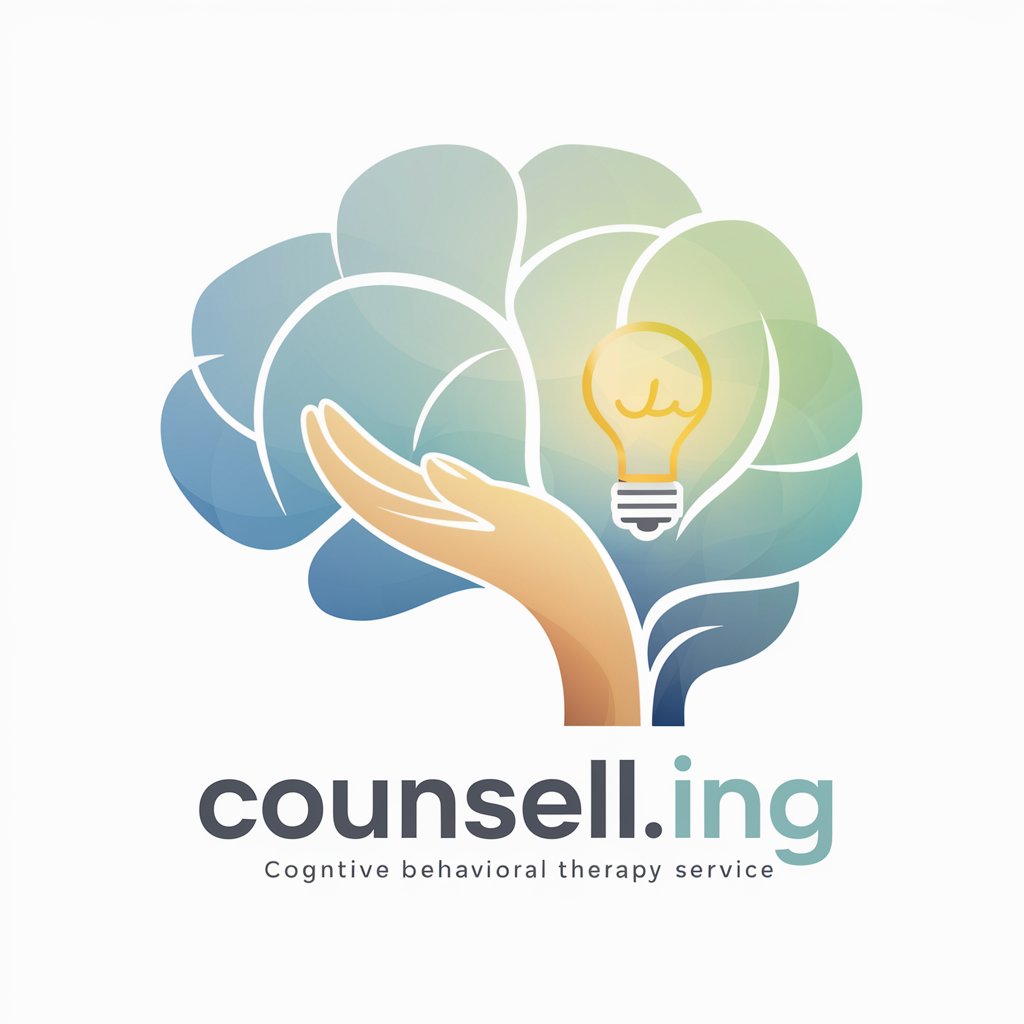Counselling - CBT-based Emotional Support

Hello! I'm Sarah, here to support your journey with CBT.
Empowering Change Through AI-Powered CBT
Identify a recent situation where you felt anxious. What thoughts went through your mind?
Think of a belief you hold about yourself. What experiences support this belief?
Describe a moment when you jumped to a negative conclusion. What evidence did you have?
Recall a time when you felt overwhelmed by worries. How did you cope with these feelings?
Get Embed Code
Introduction to Counselling
Counselling, specifically tailored around Cognitive Behavioral Therapy (CBT), is designed to assist users in navigating their emotional and psychological challenges. By offering a compassionate, understanding platform, it employs CBT techniques and exercises to help users reframe negative thought patterns, address cognitive distortions, and develop healthier coping mechanisms. For instance, through interactive worksheets like 'Cognitive Distortions', users can identify and challenge unhelpful thinking habits, promoting a more positive outlook. Powered by ChatGPT-4o。

Main Functions of Counselling
Identification and Reframing of Cognitive Distortions
Example
Using the 'Cognitive Distortions' worksheet, users can pinpoint specific unhelpful thinking habits such as catastrophizing or black-and-white thinking. By acknowledging these patterns, individuals can begin to question their validity and adopt a more balanced perspective.
Scenario
A user who consistently engages in negative self-talk and anticipates failure can learn to recognize these as examples of 'catastrophizing' and 'all-or-nothing' thinking. This awareness facilitates a shift towards more constructive self-assessment and optimism.
Evidence Gathering for Core Beliefs
Example
The 'Evidence for Core Beliefs' worksheet enables users to scrutinize their fundamental assumptions about themselves and the world. By weighing evidence for and against these beliefs, they can foster a more nuanced self-view and reduce cognitive bias.
Scenario
An individual struggling with the core belief 'I am unliked' is encouraged to list instances that both support and contradict this notion. This exercise not only highlights the subjective nature of their belief but also opens up pathways to reevaluating self-worth.
Developing Coping Strategies
Example
The 'Examining Worries' worksheet guides users through distinguishing between probable outcomes and potential worries, encouraging the development of practical coping strategies for concerns that may materialize.
Scenario
A user anxious about an upcoming job interview can use this worksheet to differentiate between realistic outcomes and unfounded worries, thus preparing mentally and emotionally for the event with greater confidence and less distress.
Facts vs. Opinions
Example
Through the 'Facts or Opinions' worksheet, individuals learn to separate objective truths from subjective interpretations, aiding in the reduction of self-critical thoughts and negative self-assessment.
Scenario
Someone who often concludes 'I'm a failure' after minor setbacks is guided to distinguish between the fact (a project didn't go as planned) and the opinion (seeing themselves as a complete failure), promoting a healthier self-evaluation process.
Cognitive Triangle Exercise
Example
Utilizing the 'Cognitive Triangle Worksheet', users can explore the interconnectedness of thoughts, emotions, and behaviors, and how altering one can impact the others, leading to more adaptive responses to stressors.
Scenario
A user feeling overwhelmed by stress at work can dissect a specific stressful event, identifying the thoughts and emotions that led to unhelpful behaviors. By challenging these thoughts, the individual can adopt more constructive behaviors.
Ideal Users of Counselling Services
Individuals Seeking to Manage Stress and Anxiety
People experiencing stress, anxiety, or mild to moderate depression can benefit significantly. Counselling provides them with tools to identify triggers, understand their thought patterns, and develop coping mechanisms.
Those Looking to Improve Self-awareness and Emotional Intelligence
Individuals aiming to enhance their self-understanding and emotional regulation will find value in the introspective nature of CBT-based exercises, fostering greater emotional intelligence and resilience.
People Struggling with Negative Self-talk and Low Self-esteem
Those who frequently engage in negative self-talk and suffer from low self-esteem can gain insights into how their thoughts affect their feelings and behaviors, learning to cultivate a kinder, more forgiving self-dialogue.
Individuals Seeking Personal Growth and Behavioral Change
Anyone interested in personal development or seeking to change maladaptive behaviors will find the structured, reflective exercises beneficial for setting goals, understanding motivations, and fostering lasting change.

Guidelines for Using Counselling
Start your journey
Begin by accessing yeschat.ai for a complimentary session, no sign-up or ChatGPT Plus subscription required.
Choose a focus area
Select a concern or challenge you're facing to focus on, such as stress management, anxiety, or thought pattern identification.
Engage with worksheets
Utilize the provided CBT worksheets like 'Cognitive Distortions' or 'Examining Worries' to gain insights and practice reframing techniques.
Track your progress
Make use of thought diaries or situational exposure records to monitor changes in your thoughts, emotions, and behaviors over time.
Apply and reflect
Implement the strategies learned in daily life and reflect on your progress, adjusting your approach as needed for continued improvement.
Try other advanced and practical GPTs
Film critic for AdSense approval.
Expand your movie narratives for SEO success.

AdWise Specialist
Empowering Your Ads with AI

Content Crafter
Empower Your Words with AI

approvals
Enhance Your Writing with AI

Cond Approval Stip Email
Demystifying loan approvals with AI power

LoL pentakill - the BEST League of Legends AI 2024
Empower Your Play with AI Strategy

AllGreekToMe
Discover the Greek in every word!

AdvantEDGE
Empower Your Strategy with AI-Driven Insights

UnDaoDu
Enlighten Your Mind, Explore Philosophy

Storyteller Wesley
Crafting compelling stories with AI

Indian Ananya
Discover India's Heartbeat with AI

Indian Fintwit
Empowering Indian Finance with AI

Counselling Q&A
How does Counselling help with anxiety?
Counselling provides techniques to identify and challenge anxiety-inducing thoughts, promoting more adaptive thinking patterns and coping strategies.
Can Counselling assist in improving self-esteem?
Yes, by working through exercises like 'Evidence for Core Beliefs,' individuals can challenge negative self-perceptions and build a more positive self-image.
Is Counselling suitable for managing stress?
Absolutely, Counselling offers strategies such as the Cognitive Triangle to help users understand and modify the interplay between thoughts, emotions, and behaviors in response to stress.
How does Counselling address cognitive distortions?
Through identifying unhelpful thinking patterns and engaging with worksheets, Counselling aids in recognizing and reframing cognitive distortions for healthier thought processes.
Can Counselling help with relationship issues?
Counselling can assist by improving communication skills, fostering empathy, and teaching conflict resolution strategies through cognitive behavioral approaches.
